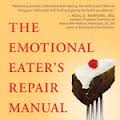

Written byJulie M. Simon, MA, MBA, LMFT
Reviewed by Meagan Rothschild
Don’t let the title fool you. The Emotional Eater’s Repair Manual is for a population much broader than strictly emotional eaters. While it is a must read for anyone struggling with overeating, it is beneficial for any reader with an interest in developing a healthy lifestyle through mind, body and spiritual balance. This book outlines a program that would be a helpful strategy in the toolkit of any Eating Disorder Dietitian, particularly those looking to enhance their counseling approaches and techniques.
Julie Simon, MA, MBA, LMFT has developed a realistic approach to overcoming the underlying causes of imbalanced eating based on her Twelve Week Eating Recovery Program. Her extensive experience is evident as she follows her principles and practices with patient dialogue, clearly demonstrating the various situations in which each skill would be useful in practice.
The Emotional Eater’s Repair Manual “presents five self-care skills, five body-balancing principles, and five soul-care practices that can end overeating and dieting forever.” The author suggests reading and practicing each principle as it applies to the reader’s individual interests, something that I greatly appreciated about this book. It is broken up into three parts as follows, Part 1: Mastering Self-Care Skills, Part 2: Tuning Up Biochemistry, and Part 3: Filling Up Spiritual Reserves. I found myself bookmarking nearly every page in the self-care skills chapter, but skimmed over the nutrition and spiritual parts as they were not applicable to my current needs.
Chapter 8, Principle 1 is easily one of the most important parts of the book from an emotional eating recovery standpoint. It addresses hunger and fullness cues and suggests charting physical hunger versus emotional hunger via fullness scales and daily eating logs. Chapter 9, Principle 2 offers a wealth of nutrition knowledge, but is heavily based on vegetarianism. While the book does not force the reader into following a specific diet, Simon’s nutrition suggestions in this chapter may not be appropriate for all eating disorder patients, especially those with a tendency to restrict. That being said, she does provide general nutrition information that would be very helpful for a reader seeking basic nutrition knowledge. Overall, I agree with her philosophy of providing self-care skills and sound nutrition practices, not a quick-fix diet, to develop a healthy lifestyle void of emotional eating.
Print version $11.53 through Amazon: http://amzn.to/RwUX85
Kindle version $10.33 through Amazon: http://amzn.to/Vo4FaY
